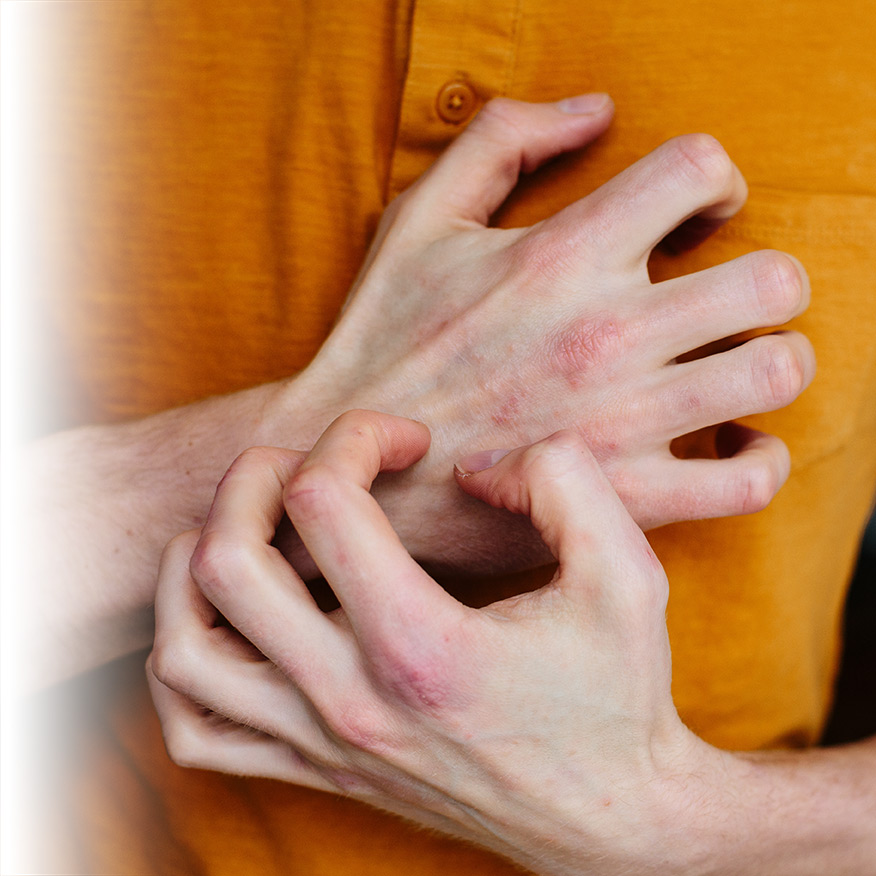Eczema is a threat to the skin on your hands that is responsible for protecting them from the stresses they face.
What is hand eczema?
Chronic hand eczema is a common skin inflammation that is not contagious. Eczema can last for months, years, or come on in flare-ups. It affects about 5% to 10% of the population.
Who is at risk?
Although hand eczema can affect anyone, some people are more likely to suffer from it than others. Many factors are involved, such as a hereditary predisposition combined with lifestyle or environmental factors that contribute to its onset.
Atopy is a genetic predisposition to atopic eczema, allergic rhinitis or allergic asthma. People with this predisposition are three times more likely to develop hand eczema than the average population, as they often experience a breakdown of the skin's protective barrier. Hand eczema can also be the manifestation of allergic contact dermatitis, part of the broad allergy family.
Some people are affected with a type of eczema called "contact eczema", which is particularly common in people who work in occupations that put the skin to the test (hairdressers, healthcare workers or those working in the fields of cleaning, food, gardening, metal, or construction, etc.). Prolonged and frequent expose to water, other liquids or irritants often promotes the onset of the problem. Proper skin care and the use of gloves are important prevention measures.
What are the symptoms of hand eczema?
The symptoms of hand eczema are many:
- dry skin
- redness
- itching
- burning sensation
- scaling (peeling skin)
- chapping, fissures (or cracking) of the skin
- oedema (swelling) of the skin
- blistering, and
- thickening of the skin
Manifestations often appear on both hands.
How can hand eczema be prevented?
Hand eczema can be prevented by adopting certain hygiene practices and healthy habits. Here are some tips to help you:
- Avoid washing your hands too often. The lipid film that protects the surface of the skin must be preserved.
- Do not use an irritating soap or product to wash the skin on your hands. Choose a cleansing product that is fragrance-free, gentle, and hypoallergenic.
- When you dry your hands after washing them, gently pat them dry using a clean cloth or towel. Do not rub them vigorously.
- Moisturize your skin regularly. Use a quality, gentle, fragrance-free moisturizer or emollient specifically designed for people with eczema.
- If you have noticed that your hand eczema seems to be caused by an allergy or by contact with a given product or substance, avoid this causative agent as much as possible.
- If the nature of your work involves frequent handwashing or contact with irritating products, consider applying a protective cream before and during work, or wearing gloves.
- Vinyl gloves are less likely to cause allergies than latex or rubber gloves.
- Consider wearing cotton gloves under your work gloves.
- In winter, protect your hands from the wind and cold. Wear gloves or mitts.
How is hand eczema treated?
The key with hand eczema is prevention. However, there may be times when preventive measures are not enough to prevent the condition. In these cases, it may be necessary to turn to medication. The choice of therapeutic approach will depend on the type and severity of the eczema.
Several medications can be used to control hand eczema, some of which require a prescription:
- cortisone-based topical medications (lotion, ointment, or cream)
- anti-itching medications
- topical anti-inflammatory or immunomodulating medications, and
- oral treatments (e.g., cortisone or immunomodulators) for severe and chronic eczema
Other treatments such as phototherapy (or light therapy) may also be considered.
When eczema lesions become infected, it may be necessary to take antibiotics.
If you suffer from hand eczema, your pharmacist can provide advice on the choice of products to clean, moisturize, and protect your skin. Speak to your pharmacist to make the best choices. If you must use medication, ask your pharmacist to help you make the best use of it.

